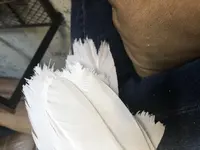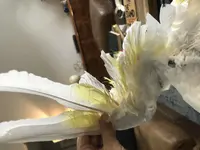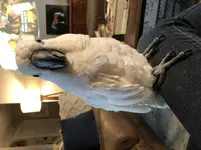Hello!
I recently adopted an 8 year old Umbrella Cockatoo last week. I owned birds growing up, but never a cockatoo or any type of large parrot. So I am a bit of a noob and hoping to get some advice. I tend to be a bit of a hypochondriac when it comes to my animals, and I’ve become concerned about some damage he has to his feathers.
I rehomed the bird from a lady in my neighborhood who had owned him for two years. She had him housed next to one other parrot, an Amazon in its 20s they owned for its whole life, who looked very healthy with no feather damage. Before this owner my cockatoo was with his breeder for the first 6 years of his life, who I never met and don’t know much about.
My cockatoo seems very healthy, friendly, and lively. I noticed when we picked him up he had some damage to the ends of his wing and tail feathers. I assumed it was cage abrasion and maybe some barbering and chewing of the feathers. However, I just started reading about PFBD and have gotten myself VERY freaked out. His tail feathers are ragged on the ends, and most of his flight feathers are extremely ragged and broken off at the ends. His wings were clipped at some point but I’m not sure how long ago. His beak looks healthy. All of the feathers that are damaged seem to be damaged at the ends. They are only damaged in areas he could reach, not at all on his head or neck.
I have a vet appointment for him Wednesday, it is the soonest I could get him in at a nearby bird vet.
I have been trying to read up on PBFD but getting extremely conflicting info. Is it something that could manifest in an 8 year old bird? Is this what it would look like? Is it ever something that can be managed recovered from? How common is it really? I could find no statistics on how common it is in the US or where it’s most commonly seen?
Sorry for all of the questions! I will attach a picture of his tail feathers, wing weathers, and a full body picture. I’m really hoping it’s just from him chewing on them. I think he was most likely caged for a lot of the day most days before we acquired him.
Any advice really appreciated!
I recently adopted an 8 year old Umbrella Cockatoo last week. I owned birds growing up, but never a cockatoo or any type of large parrot. So I am a bit of a noob and hoping to get some advice. I tend to be a bit of a hypochondriac when it comes to my animals, and I’ve become concerned about some damage he has to his feathers.
I rehomed the bird from a lady in my neighborhood who had owned him for two years. She had him housed next to one other parrot, an Amazon in its 20s they owned for its whole life, who looked very healthy with no feather damage. Before this owner my cockatoo was with his breeder for the first 6 years of his life, who I never met and don’t know much about.
My cockatoo seems very healthy, friendly, and lively. I noticed when we picked him up he had some damage to the ends of his wing and tail feathers. I assumed it was cage abrasion and maybe some barbering and chewing of the feathers. However, I just started reading about PFBD and have gotten myself VERY freaked out. His tail feathers are ragged on the ends, and most of his flight feathers are extremely ragged and broken off at the ends. His wings were clipped at some point but I’m not sure how long ago. His beak looks healthy. All of the feathers that are damaged seem to be damaged at the ends. They are only damaged in areas he could reach, not at all on his head or neck.
I have a vet appointment for him Wednesday, it is the soonest I could get him in at a nearby bird vet.
I have been trying to read up on PBFD but getting extremely conflicting info. Is it something that could manifest in an 8 year old bird? Is this what it would look like? Is it ever something that can be managed recovered from? How common is it really? I could find no statistics on how common it is in the US or where it’s most commonly seen?
Sorry for all of the questions! I will attach a picture of his tail feathers, wing weathers, and a full body picture. I’m really hoping it’s just from him chewing on them. I think he was most likely caged for a lot of the day most days before we acquired him.
Any advice really appreciated!
Last edited:



